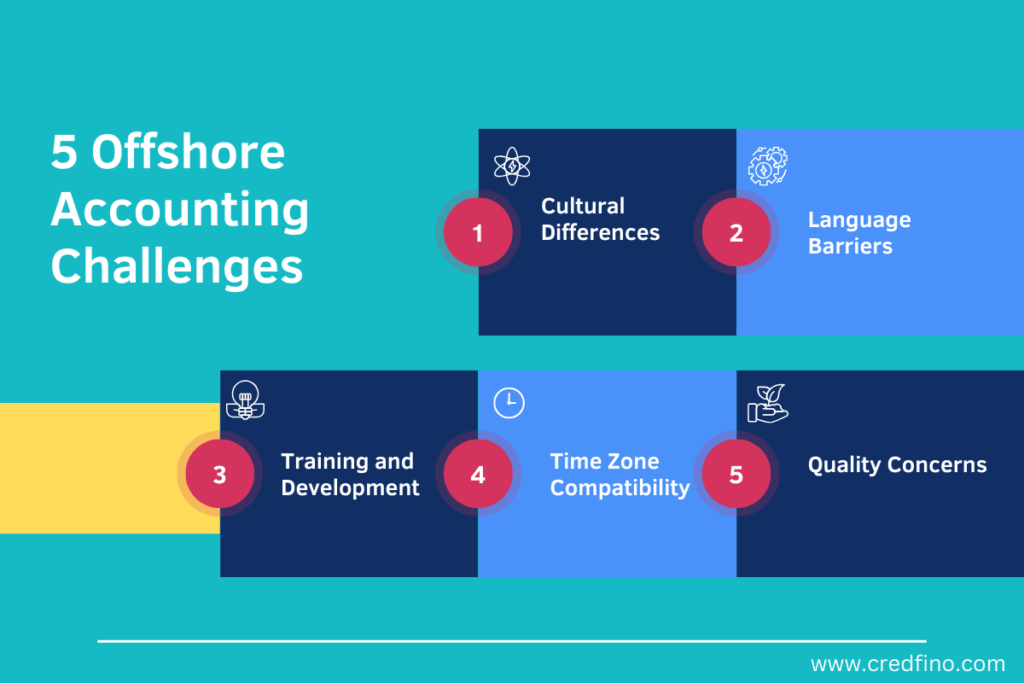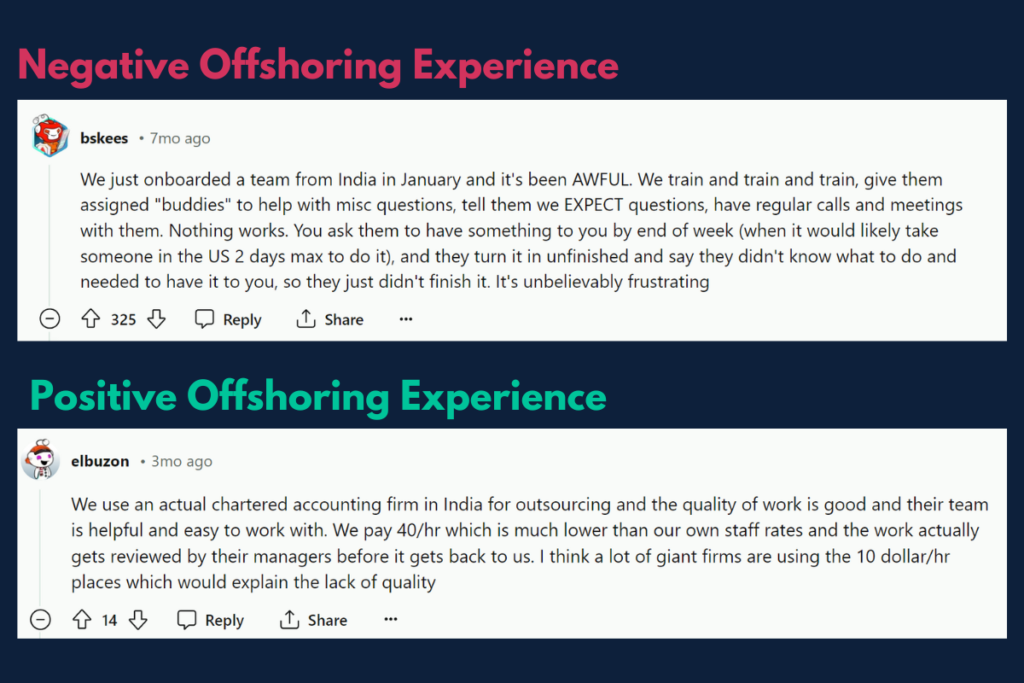5 Offshore Accounting Challenges (And Actionable Tips to Tackle Them)

Accounting Firms are turning to offshore accounting to solve capacity issues and tap into its benefits. However, like any strategy, it has its challenges.
Offshore accounting can cut costs and broaden your access to talent, but it also comes with hurdles that can impact your accounting firm’s operations. Understanding these challenges is the first step to overcoming the obstacles that come with offshoring your accounting work.

In this blog, we’ll explore the most common difficulties faced in offshore accounting and share practical strategies to tackle them effectively.
Table of Contents
Offshore Accounting Challenge #1 – Cultural Differences
Problem:
When CPAs offshore accounting overseas, cultural norms can lead to confusion. For instance, American professionals often favor open, flat communication, while Indians might uphold a strict hierarchy, valuing seniority and authority.
Impact:
- Miscommunication: Small misunderstandings can cause big mistakes in financial tasks, leading to delays.
- Work Quality: When teams miscommunicate, the quality of work drops because tasks might be done wrongly.
- Low Morale: Constant communication issues due to different cultural norms can frustrate team members, making them less motivated and satisfied with their work.
Actionable Tips:
To overcome these challenges and improve teamwork and efficiency, try these strategies:
- Foster Cultural Exchange: Try to share parts of your culture and invite your offshore accounting team to do the same. Whether it’s showing pictures from a local festival or describing a typical snowy day, sharing these personal touches can strengthen bonds and foster respect among team members.
- Utilize Effective Tools: Choose tools that boost your team’s ability to collaborate remotely. Use platforms like –
Missive for seamless email and chat communication
Zoom for necessary video calls
Teamwork for efficient project management.
These tools help streamline your offshore accounting operations.
- Personalize Management Approaches: Adapt your management style to better align with the cultural and individual preferences of your offshore team members.
Customizing your approach not only shows that you care about their comfort but also demonstrates your commitment to making their feedback a valuable part of your team’s strategy.
Treat your offshore accounting team equally valuable as your onshore team. You operate from North America and your offshore accounting team working from other parts of the world – India or Philippines, there would be differences in the ways both parties operate. Try to comprehend their ways, make them feel comfortable enough to have open communication with you and create a middle ground.
Offshore Accounting Challenge #2 – Language Barriers
Problem:
English is the global tongue, spoken in boardrooms from New York to Bangalore. Yet, offshoring to places like India and the Philippines, where English is taught from primary school, still faces a hurdle. It’s not about language proficiency but about accents and nuances.
Impact:
The consequences of language barrier issues in offshoring accounting can be:
- Miscommunication: Critical information can be lost or misinterpreted, leading to mistakes and project delays.
- Perceived Professionalism: Clients may perceive strong accents or unusual phrasing as less professional, impacting trust and confidence.
Actionable Tips:
Collaboration Platforms: Utilize platforms like Slack, Microsoft Teams, or Zoom for regular check-ins and clear communication channels.
Clear and Slow Speech: Advise offshore team members to speak slowly and clearly, avoiding local idioms and slang.
Written Communication as Backup: Use written documentation to confirm and clarify key points discussed during meetings.
Must Read – The Impact of Hybrid Work Model on Offshore Accounting
Offshore Accounting Challenge #3 – Time Zone Compatibility
Problem:
When working with global employees, different time zones is a natural thing that you can’t control. Your morning turns out to be their night. By following asynchronous communication in offshore accounting, you will be impacting their career progression as there would be limited client interaction and less involvement in complex tasks demanding team efforts. Shifting the offshore accounting roles to night shift will have an impact on their health.
Impact:
- Scheduling Conflicts: Coordinating meetings and project updates can be tough when team members are in different time zones.
- Delayed Responses: Waiting for responses due to time differences can slow down project progress and decision-making.
- Reduced Real-time Collaboration: Lack of real-time interaction can hinder problem-solving and information flow.
- Burnout: Team members working outside their regular hours may experience burnout, affecting their productivity and motivation.
Actionable Tips:
- Survey Team Members: Gather feedback from your team to understand the impact of time zone differences and adjust processes accordingly.
- Flexible Scheduling: Use flexible scheduling to work around different time zones. Schedule key meetings at times that work for most team members. Implement three shifts: early morning to align with US afternoons, evening to match US mornings, and daytime for tasks that don’t require immediate collaboration.
Example: A meeting scheduled at 3 PM US time will be at 6:30 AM the next day in India, fitting into the early morning shift. And a meeting scheduled at 9 AM US time will be at 6:30 PM in India, fitting into the evening shift.
- Asynchronous Communication: Encourage asynchronous communication using tools like email and project management software to allow team members to work at their own pace.
- Clear Protocols: Establish clear communication protocols to manage expectations and minimize delays. For eg. Reply within 24 hours.
- Minimize Difference: Choose an offshore country with a smaller time zone difference. When offshoring tasks like accounting, choosing the right country based on time zone differences can significantly impact efficiency and accuracy.
India’s time zone allows for a more convenient overlap with US business hours. By having the Indian team start their workday in the evening and continue until 2 AM, they can effectively match the standard 8 AM to 5 PM EST working hours. This schedule ensures that the Indian team is available during critical US business hours, facilitating real-time communication, quick responses to queries, and timely completion of tasks.
In contrast, the same overlap with the Philippines would require their team to work till 5 AM, which is considered a graveyard shift. Working during these hours can lead to higher rates of fatigue and errors
Offshore Accounting Challenge #4 – Training and Development

Problem:
When offshoring accounting to a freelancer or a small service provider, it is important to be aware that your accounting practices might differ from those of your onshore staff. They may not be as up-to-date with current standards as your onshore team, which can lead to quality issues.
As shown in the picture, Reddit users have shared both positive and negative offshore accounting experiences.
The right offshore accounting service provider can make all the difference in your offshore experience.
Another issue with training can happen if offshore service provider appoints a junior staff to handle tasks that were meant for senior staff. Also, offshore partners may lack a solid quality assurance process. More on this in Challenge #5.
These challenges are less common when working with professional service providers.
Impact:
- Quality Issues: Without proper training, there can be significant discrepancies in work quality, leading to errors and inefficiencies.
- Misalignment: Different standards and procedures can cause confusion and misalignment between onshore and offshore teams.
- Reduced Productivity: Lack of proper training can lead to slower work processes and increased errors, impacting overall productivity.
Actionable Tips:
- Select an offshore partner committed to thorough employee training.
- Conduct regular training sessions to keep the offshore team updated with the latest accounting standards, technologies, and best practices.
- Implement mentorship and coaching by pairing less experienced employees with mentors for guidance and support.
- Ensure open communication between onshore and offshore teams, encouraging feedback and making offshore employees feel heard and valued.
- Ask for staff trained in US GAAP standards.
Must Read – Offshored vs Outsourced Accounting – What is Better?
Offshore Accounting Challenge #5 – Quality Concerns
Problem:
A common issue is the quality of work received. Accountants often find that the work is not up to standard and requires rework. This can be due to two main factors: either the staff performing the work are unqualified, or there is no quality check process in place by the offshore partner.
Many overseas accountants, like those in India, are highly skilled and often work for top firms. However, the main issue is ensuring consistent quality. Without this quality layer, you may spend more time fixing errors instead of focusing on strategic tasks.
Impact:
- Errors and Rework: Inconsistent quality leads to mistakes, requiring additional time and resources to correct.
- Client Dissatisfaction: Poor quality can result in dissatisfied clients, which can harm your reputation and client retention.
- Operational Inefficiency: Frequent errors disrupt workflow, making it harder to complete tasks efficiently.
Actionable Tips:
- Partner with Quality-Focused Providers: Choose offshore accounting service providers that prioritize quality control. They should have strong processes in place to ensure high standards are met.
- Pair Senior and Junior Staff: Include senior staff to review the work done by junior staff. This extra layer of oversight ensures the offshore work is reliable.
- Use SOPs: Create and use SOPs that clearly outline what the finished work should look like. This helps set clear expectations for quality and consistency.
Concluding Thoughts
Overcoming the challenges of offshore accounting isn’t as tricky as it might seem. Given the ongoing capacity issues and burnout among accountants, offshoring presents a strategic solution.
If you’re still on the fence, here’s a quick overview to help you understand the actionable tip for each problem and navigate potential hurdles.
| Problem | Impact | Actionable Tips |
| Cultural Differences | Miscommunication, Poor Collaboration, Work Quality, Low Morale | Foster Cultural Exchange, Utilize Effective Tools, Personalize Management Approaches |
| Language Barriers | Miscommunication, Perceived perception in client calls | Collaboration platforms, Clear speech, Written communication as backup |
| Time Zone Compatibility | Scheduling Conflicts, Delayed Responses, Reduced Real-time Collaboration, Burnout | Survey Team Members, Flexible Scheduling, Asynchronous Communication, Clear Protocols, Minimize Difference |
| Training and Development | Quality Issues, Misalignment, Reduced Productivity | Select committed offshore partner, Conduct regular training, Implement mentorship and coaching, Develop and use SOPs, Ensure open communication |
| Quality Concerns | Errors and Rework, Client Dissatisfaction, Operational Inefficiency | Partner with Quality-Focused Providers, Pair Senior and Junior Staff, Provide Comprehensive Training, Use SOPs |
How Partnering with Credfino Can Enhance Your Offshoring Experience?
At Credfino, we understand the frustrations that can come with offshoring.
That’s why we’ve developed a meticulous approach with 3-pillars to ensure you get the best results.
Our Team
We take pride in our strict selection process. Each member of our team is not only skilled and experienced but also has in-depth knowledge in their field. Our team members are trained in US GAAP, participate in weekly training sessions, engage in cross-functional domain work, and undergo mock tests to ensure their understanding and proficiency.
Communication
We believe in keeping you informed every step of the way. By establishing a regular update structure, we ensure you receive timely updates about your projects. You’ll always be in the loop and never feel out of touch with what’s happening.
Quality Assurance
We take quality seriously. Our internal training programs are rigorous, and we have a quality control layer where senior staff reviews all work before it’s delivered. This ensures the reliability of our work, so you can trust that it meets high standards and won’t require rework.
If your last offshoring experience left you dissatisfied, it’s probably because the right framework wasn’t in place.
At Credfino, we’ve refined our process to eliminate those common issues.
Feeling frustrated with your current partner? It might be time for a change.
Join our list of happy clients.
Click here to schedule a meeting and see build an offshore accounting team that delivers the kind of output you are looking for.
Must Read – Error-Free Reporting While Engaging With Offshore Accounting Firms
Frequently Asked Questions
Offshore accounting is when a company outsources its accounting tasks to a team or firm located in a different country. This can help reduce costs, access a broader talent pool, and increase efficiency.
To overcome cultural communication barriers, provide cross-cultural training, use clear and simple language, and encourage open communication. Establish clear protocols and use tools like video conferencing to enhance understanding and collaboration.